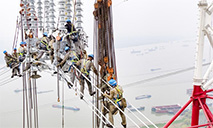U.S. private prisons continue to profit despite Biden's executive order
NEW YORK, March 17 (Xinhua) -- An executive order signed a year ago by U.S. President Joe Biden to terminate federal private prison contracts seems to have little effect on private contractors, who have been engaging in this business as usual over the past year.
Just days after assuming presidency, Biden signed on Jan. 26, 2021 the executive order in a bid to reform the country's incarceration system and eventually phase out the use of private prisons.
Although some private facilities did not get their expired contracts renewed since then, few of them have been shut down. Instead, companies running them have been finding ways to circumvent the executive order.
Last month, the GEO Group, one of the largest for-profit operators of private prisons in the United States, reported revenues of 2.26 billion U.S. dollars for the full year 2021, with an adjusted net income of 159.2 million dollars, or 1.32 dollars per diluted share.
Both of the company's net income and per-share net income rose significantly from 2020's 113 million dollars and 0.94 dollar, respectively, even though the contracts of two of its facilities expired in November and did not get renewed with the Federal Bureau of Prisons.
CoreCivic, the world's largest private prison operator entered into a new three-year lease agreement with the State of New Mexico in September 2021 at the company's 596-bed Northwest New Mexico Correctional Center, which was previously operated by the company itself.
Statistics show that the United States tops the world in terms of incarceration rate. Over 2 million people are currently in the country's prisons and jails, a 500-percent growth over the past 40 years. The country has a quarter of the world's prison population, though it makes up only less than 5 percent of the global population.
Private prisons in the United States incarcerated 115,428 people in 2019, representing 8 percent of the total state and federal prison population. Since 2000, the number of people housed in private prisons has increased 32 percent compared to an overall rise in the prison population of 3 percent, according to a report of The Sentencing Project, a Washington-based advocacy group.
Private prisons have been widely criticized for understaffing and insufficient training, drug abuse, assault, forced labor and shortage of medical treatment, among others.
In addition, companies operating private prisons also meddle with politics by donating a huge amount of money to political parties and their electoral candidates in order to secure contracts.
Private prisons are believed to be one of the reasons for increased incarceration. A study by researchers from Washington State University found that "when states turn to private prisons, the number of criminals incarcerated rises and the length of sentences increases."
Increased incarceration also reflects worsening racial problems. Statistics from the American Civil Liberty Union show that one out of every three African American boys born today can expect to go to prison in his lifetime, while that for Latino boys is one in six and for white boys one in 17. Meanwhile, women comprise the fastest growing incarcerated population in the United States.
Private prisons are notorious for human rights infringement. To make profits, private prisons make the lowest possible payments to staff, and cut cost in medical care. Inmates have to work all day for money barely enough to buy necessities such as toilet paper and toothpaste.
A report of the Brennan Center for Justice said prisoners in American correctional facilities have for decades worked for no wages or mere pennies an hour. The COVID-19 pandemic has made things worse, with more than a dozen states relying on this captive labor force to produce hand sanitizers, toilet paper and other personal protective equipment at an extremely low cost.
Non-profit organization Abolish Private Prisons said on its website that the United States has a dark history of exploiting the lives of disadvantaged groups for the profit of the powerful -- from colonial slavery through coolie labor, black codes, and Jim Crow laws to locking people up for profit -- simply the latest incarnation of slavery.
"Keeping the country safe by separating dangerous individuals from the rest of the population is a core government function that cannot be delegated to a private company whose interest is making money," the organization stated.
Photos
Related Stories
- U.S. strategically provokes Russia, neutralizes Europe to consolidate influence zones: expert
- Women in low-wage jobs in U.S. losing billions yearly: CNBC
- Detainee at CIA detention site served as training prop to teach interrogators torture techniques: The Guardian
- U.S. a typical example of big countries bullying small countries: FM spokesperson
- Prolonged violation of children's rights in U.S. saddening: Chinese spokesperson
Copyright © 2022 People's Daily Online. All Rights Reserved.










